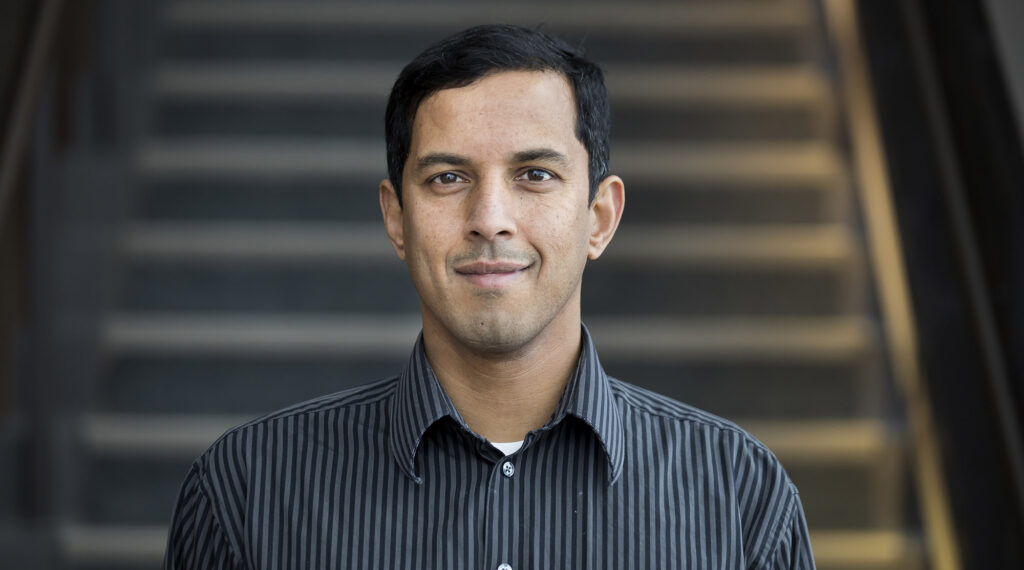Vijay Subramanian receives 2023 Ernest and Bettine Kuh Distinguished Faculty Award

Vijay Subramanian, associate professor of electrical engineering and computer science, has been named the 2023 recipient of the Ernest and Bettine Kuh Distinguished Faculty Award for his outstanding contributions to research, service, and teaching in the area of networked systems.
Subramanian’s research has focused in the past on the probabilistic analysis of communication networks, especially analysis of scheduling and routing algorithms. His current research interests are on game theoretic and economic modeling of socio-technological systems and networks, and the analysis of associated stochastic processes.
Stated more plainly, Subramanian develops new algorithms and analysis techniques for the design of networked systems with the goal of making them efficient system-wide by creating incentives for users – who are often strategic in their decision making and interactions with each other. Example applications include scheduling and resource allocation problems in wireless networks, transactions in e-commerce platforms like Amazon that utilize user reviews, and determining how likely opinions and technology in social networks are to spread and be adopted by others. In related work, he is investigating how disease spreads throughout networks that are formed by the physical interactions of people.
His work uses and develops cutting-edge methods in probability and optimization and is highly interdisciplinary in nature, occurring at the intersection of wireless communications, communication networks, information theory, operations research and mathematical biology.
During his time at Motorola (2004-06), Subramanian developed solutions to support wireless data for products adhering to the 2.5-4.5G standards. Specifically, his work focused on radio resource management plus resource allocation and scheduling for wireless networks. His algorithms were incorporated into several Motorola products. Also, the scheduling algorithms that he developed and the approach he took are still core to current LTE-based base-stations and access points in Nokia products. His work led to several patents related to wireless scheduling, as well as energy efficient and improved signaling and location management during call and data transfers.
Subramanian has held leadership positions in several conferences and workshops related to communication theory and wireless communications. These include co-organizer of the 2022 Learning-based Control of Queues and Networks (LBCQN) Workshop, held in conjunction with the 2022 ACM Sigmetrics conference, and the 2021 Reinforcement Learning and Stochastic Control in Queues and Networks (ReStoq) Workshop, held in conjunction with the 2021 International Symposium on Modeling and Optimization in Mobile, Ad hoc, and Wireless Networks (WiOpt) conference; technical program chair for WiOpt 2020, and for the 2019 ACM International Symposium on Theory, Algorithmic Foundations, and Protocol Design for Mobile Networks and Mobile Computing (MobiHoc); and co-chair of the 6th Midwest Controls & Game Theory Workshop.
In addition to teaching established undergraduate and graduate courses, he developed three courses: Analysis of Societal Networks (which is now a permanent course offering), Probabilistic Analysis of Large Scale Systems, and Introduction to Social, Economic and Technological Networks.
He has graduated 9 doctoral students, and authored 12 U.S. patents, most recently in 2021 for research related to load balancing.
Subramanian received his PhD in electrical engineering from the University of Illinois at Urbana-Champaign. He worked in industry for seven years, then shifted his focus to academia. Prior to joining Michigan in 2014, he was a research assistant professor at Northwestern University, and a research fellow at the Hamilton Institute in Maynooth University, Co. Kildare, Ireland.
About the Ernest and Bettine Kuh Distinguished Faculty Award
Ernest and Bettine Kuh established the Ernest and Bettine Kuh Distinguished Faculty Award to recognize an outstanding associate professor for their teaching, research, and service. The award includes an annual stipend.
Ernest Kuh (1918-2015) graduated from Michigan with his bachelor’s degree in electrical engineering in 1949. He then received his master’s and doctoral degrees in electrical engineering from Stanford University. A pioneer in electronic circuit theory, he is widely considered one of the fathers of electronic design automation (EDA).
Ernest S. Kuh (1928 – 2015): Pioneer in Electronic Circuit Theory and EDA
ECE honored with the Ernest and Bettine Kuh Distinguished Faculty Award